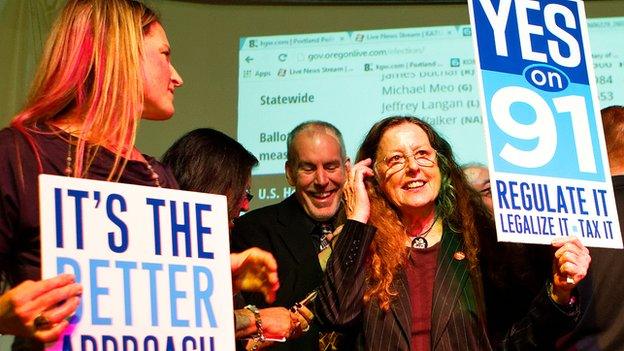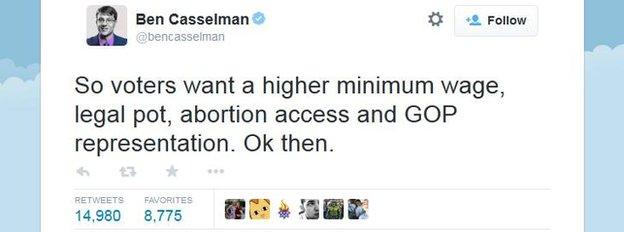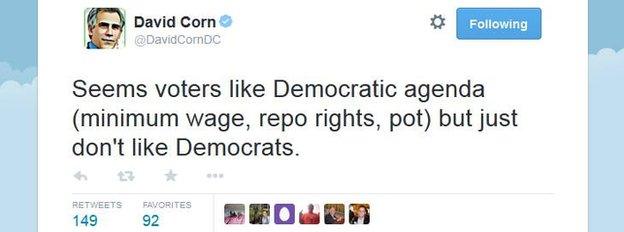Ballot initiatives: Liberalism up, Democrats down
- Published
- comments

Oregon voters approve marijuana possession and sale
Call it the Great Conundrum of Tuesday's election returns.
While voters were sending Democratic candidates packing in key races across the country, they were also approving numerous ballot measures, external closely tied to liberal causes.
In Arkansas, Nebraska and South Dakota, for instance, Democratic Senate candidates were soundly defeated while minimum-wage hikes - a major Democratic talking point this year - passed. Alaska also backed a measure, but its Senate race is still in doubt.
Washington voters approved mandatory background checks on firearm sales at gun shows and re-elected a Republican controlled state Senate. Colorado and North Dakota rejected a measure that would grant foetuses legal "personhood", which likely would have curtailed some abortion rights and contraceptive methods.
Massachusetts passed a paid sick leave programme while also electing a Republican governor. Californians approved sentence reductions for non-violent criminals as the state's Democratic legislative majorities were trimmed. And Alaska, Oregon and Washington, DC backed legalisation of marijuana possession.
(A majority of Florida voters also supported legalising marijuana for medical uses, but it failed to garner the 60% approval necessary for passage.)
A California county and a town in Texas banned the shale oil removal process called fracking.
The results can't all be claimed as wins for a liberal-leaning agenda - another California county rejected a fracking ban, Tennessee passed an anti-abortion constitutional amendment and Georgia capped income taxes. Enough went the Democrats' way, however, for some on the left to celebrate - and agonise over the perceived irony of the results.

"Tonight's winners: Higher minimum wage, legal weed, gun control, access to abortion, reduced sentences. And the party who opposes all of it," tweets, external Seattle-based internet entrepreneur Ben Huh.
"Even as the Democratic Party got an old-fashioned whuppin'," writes, external Bloomberg View's Francis Barry, "traditional Democratic issues had an awfully good night."
Before liberals start touting their silver lining playbook, however, there's still the grim fact that Democrats ran on these issues - and lost in droves.
According to the Washington Post's Greg Sargent, the problem is that while voters are in favour of things like raising the minimum wage, they doubted Democrats ability to competently manage the nation's economy.
"These voters want to hear a more comprehensive message about how Democrats would move the economy forward," he writes, external. And according to the Democratic pollsters Sargent spoke with, President Barack Obama's handling of issues like the Islamic State, Ebola and border security repeatedly called his competence into question.

These doubts didn't just pop up with this summer's controversies, however. As the New Republic's John B Judis points out, external, the grievous blow to Mr Obama's credibility - and, by extension, to that of his fellow Democrats - occurred last fall, with the botched rollout of the federal healthcare website.
"That was Obama's Katrina, and it turned out to be the Democrats' as well," he writes. "Of course, the administration subsequently repaired the program, but the political damage was lasting. It occurred at just that time when the issues of the coming election were being defined."
So while ballot measures across the country seem to indicate that Democratic issues can still be winners, the Democratic Party brand is damaged - and Mr Obama may not have the time, and ability, to fully repair it.
It's a formidable task that will fall on the shoulders of the party's next presidential nominee.